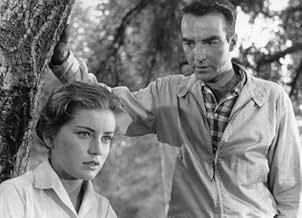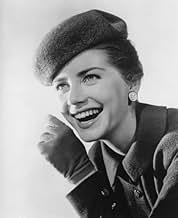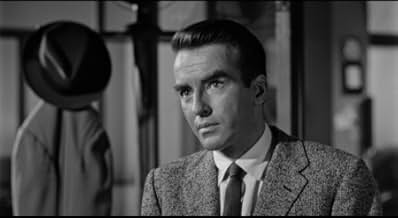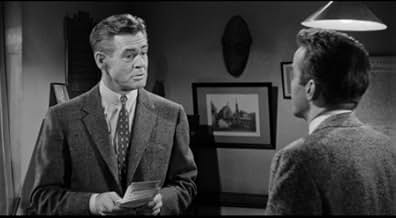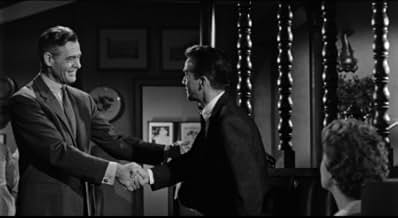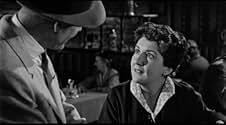VALUTAZIONE IMDb
6,6/10
1623
LA TUA VALUTAZIONE
Aggiungi una trama nella tua linguaEager for a job, journalist Adam White accepts the lowly position of columnist for the advice-giving section of the Chronicle but he often clashes with his cynical editor, Shrike.Eager for a job, journalist Adam White accepts the lowly position of columnist for the advice-giving section of the Chronicle but he often clashes with his cynical editor, Shrike.Eager for a job, journalist Adam White accepts the lowly position of columnist for the advice-giving section of the Chronicle but he often clashes with his cynical editor, Shrike.
- Regia
- Sceneggiatura
- Star
- Candidato a 1 Oscar
- 2 candidature totali
Johnny Washbrook
- Johnny Sargeant
- (as John Washbrook)
Recensioni in evidenza
I liked the movie and the one thing about it that I didn't like was Monty. He was too old by at least 15 years for the part, the girl and the hurt. The hurt was a young man's hurt. Robert Ryan had the lock on the mature man's regret and Monty was supposed to be at the front end of the voyage but having been acting and living in bathos for all his life,he was too well seasoned. Instead of a boy whose dad had left him wounded and who was going to emerge from this transformed and transforming, he was Monty front and center and always. I loved Ms. Hart's Justy. Now there's a characterization who developed and a person who was and became. Ryan was once a boy, became a hard and then a bitter man and perhaps regained a bit of himself at the end. Ms. Loy, well-faded but true, a lodestar who was beyond much but hope, the inverse of Ms. Stapleton but in some ways more than that and the true core of the film in that she was a Lonelyheart even though she had material comfort. I'll admit it, I liked Monty in some of his roles but in this,he is terribly miscast. He might have pulled it off before we learned too much about him and his self-pity but alas, the part and the actor met too late. At bottom, his compassion for others here, as in in almost every other role, was just self-pity writ large.
Nathaniel West's "Lonelyhearts" is a haunting novella about how an idealistic young man is affected by his job as an advice-giving columnist for his town's newspaper. It was intelligently adapted for the stage in the mid-50's, and the film version plainly uses that adaptation as a reference point as much as the novel itself. In ways, the film expands on the play's success, opening it up to reveal an idealized 50's picture-postcard town on the surface before centering on the insensitivity lying just underneath. Writer/Producer Schary and Director Donohue are to be commended for the atmosphere they have successfully created. It is unfortunate that they did not have enough faith in the material to resist the temptation to give it a happy ending, an ending which really is not in keeping with the events which precede it.
It must have seemed like a great idea to cast Montgomery Clift in the lead role of Adam, and a few years earlier it would have been, but this compelling actor's personal demons had so impacted upon him by this time that it is impossible not to be distracted by his unhealthy state of being. His slurred speech, unsteady gait and jerky mannerisms are entirely at odds with this character, who is said to have never had a stronger drink than a coca-cola. He is too good of an actor not to have effective moments - he works beautifully with Onslow Stevens, who plays his father - but this is a performance that holds our attention largely for unintentional reasons. Maureen Stapleton is sensational in her film debut as a writer to the column who manipulates Adam, and her performance would be right at home in a more faithful and successful version of this novel. Otherwise, this is a well-intended film which fails both to adequately reflect the novel on which it is based and to succeed on it's own terms.
It must have seemed like a great idea to cast Montgomery Clift in the lead role of Adam, and a few years earlier it would have been, but this compelling actor's personal demons had so impacted upon him by this time that it is impossible not to be distracted by his unhealthy state of being. His slurred speech, unsteady gait and jerky mannerisms are entirely at odds with this character, who is said to have never had a stronger drink than a coca-cola. He is too good of an actor not to have effective moments - he works beautifully with Onslow Stevens, who plays his father - but this is a performance that holds our attention largely for unintentional reasons. Maureen Stapleton is sensational in her film debut as a writer to the column who manipulates Adam, and her performance would be right at home in a more faithful and successful version of this novel. Otherwise, this is a well-intended film which fails both to adequately reflect the novel on which it is based and to succeed on it's own terms.
Montgomery Clift is a writer hired to be "Miss Lonelyhearts" for a newspaper in "Lonelyhearts," a 1958 film also starring Robert Ryan, Myrna Loy, Delores Hart, and Maureen Stapleton in her film debut.
About 30 years ago - yes, 30 - I saw the play "Miss Lonelyhearts" with none other than Kelsey Grammar, who had not yet gone to Hollywood. The play, as well as the book, are quite different from what ended up on the screen. In the film, the ending was changed to a more upbeat one.
This is a great film if you're contemplating suicide because this will take you right over the edge. It is relentlessly depressing with some pathetic characters and some unlikeable ones. Adam (Clift)is a man with a hidden past that he keeps even from his girlfriend (Delores Hart). All the viewer really knows at first is that he was raised in an orphanage and has a father in prison. The paper on which Adam works is owned by William Shrike, an abusive, cynical man (Ryan) who is horrible not only to his employees but to his wife (Myrna Loy) because of her infidelity 10 years before. This is a man who carries a grudge. When he meets Adam, he thinks his sincerity is fake and becomes determined to wear him down. His first step is to hire him as Miss Lonelyhearts. Adam becomes very bothered by the problems his readers send to him, especially because he can't help anyone. When Shrike dares him to meet one of the letter-writers, he does so. It's Maureen Stapleton, a needy woman with a crippled husband who can't make love to her.
The performances in this film are very good, but the film isn't. Clift apparently was very disappointed in it because it lacked none of the bite of the novel and none of the symbolism of Adam as a Christlike figure bearing the sins of others. Robert Ryan is very convincing as the hateful Shrike, and Myrna Loy is beautiful and sad as his wife. Stapleton received an Oscar nomination for her effective performance. An accomplished stage actress, Stapleton evokes the desperation of this lonely woman.
Montgomery Clift by this time was almost at a point where he was dependent upon the kindness of strangers. He was too much of a risk for Hollywood to be interested. Like so many people who are victims of horrible accidents, he had become addicted to painkillers and alcohol. If not for Elizabeth Taylor making a case for him, he would not have been cast in "Suddenly, Last Summer." As it was, Mankiewicz almost stopped shooting on the film. He is fragile and glassy-eyed here, in obvious pain, and his voice slurs. The fragility works well in this role as does the sensitivity he brings to the part. He still had a beautiful smile, which unfortunately he doesn't get to use much here.
It's always wonderful to see Montgomery Clift perform, even toward the end of his career. That interesting voice of his, the intelligence and sensitivity of his work, and the tenderness with which he approached a love scene were unmatched. His film career was relatively short, but he left a powerful legacy. "Lonelyhearts" is not a great film, but it stars Montgomery Clift, so it's worth seeing.
About 30 years ago - yes, 30 - I saw the play "Miss Lonelyhearts" with none other than Kelsey Grammar, who had not yet gone to Hollywood. The play, as well as the book, are quite different from what ended up on the screen. In the film, the ending was changed to a more upbeat one.
This is a great film if you're contemplating suicide because this will take you right over the edge. It is relentlessly depressing with some pathetic characters and some unlikeable ones. Adam (Clift)is a man with a hidden past that he keeps even from his girlfriend (Delores Hart). All the viewer really knows at first is that he was raised in an orphanage and has a father in prison. The paper on which Adam works is owned by William Shrike, an abusive, cynical man (Ryan) who is horrible not only to his employees but to his wife (Myrna Loy) because of her infidelity 10 years before. This is a man who carries a grudge. When he meets Adam, he thinks his sincerity is fake and becomes determined to wear him down. His first step is to hire him as Miss Lonelyhearts. Adam becomes very bothered by the problems his readers send to him, especially because he can't help anyone. When Shrike dares him to meet one of the letter-writers, he does so. It's Maureen Stapleton, a needy woman with a crippled husband who can't make love to her.
The performances in this film are very good, but the film isn't. Clift apparently was very disappointed in it because it lacked none of the bite of the novel and none of the symbolism of Adam as a Christlike figure bearing the sins of others. Robert Ryan is very convincing as the hateful Shrike, and Myrna Loy is beautiful and sad as his wife. Stapleton received an Oscar nomination for her effective performance. An accomplished stage actress, Stapleton evokes the desperation of this lonely woman.
Montgomery Clift by this time was almost at a point where he was dependent upon the kindness of strangers. He was too much of a risk for Hollywood to be interested. Like so many people who are victims of horrible accidents, he had become addicted to painkillers and alcohol. If not for Elizabeth Taylor making a case for him, he would not have been cast in "Suddenly, Last Summer." As it was, Mankiewicz almost stopped shooting on the film. He is fragile and glassy-eyed here, in obvious pain, and his voice slurs. The fragility works well in this role as does the sensitivity he brings to the part. He still had a beautiful smile, which unfortunately he doesn't get to use much here.
It's always wonderful to see Montgomery Clift perform, even toward the end of his career. That interesting voice of his, the intelligence and sensitivity of his work, and the tenderness with which he approached a love scene were unmatched. His film career was relatively short, but he left a powerful legacy. "Lonelyhearts" is not a great film, but it stars Montgomery Clift, so it's worth seeing.
In view of some of the comments categorizing this film as unsatisfying soap opera, it all depends on what you're looking for. If what you want are excellent performances from a superior cast, then this is your kind of movie. Robert Ryan gives his typical outstanding performance as an extremely cynical newspaper editor who inflicts his particular brand of misery to the full on his long-suffering wife, beautifully portrayed by Myrna Loy. Maureen Stapleton is electrifying in her movie debut and received a well-deserved Oscar nomination for her riveting performance. Montomgery Clift's fragility works to his advantage here as an advice columnist whose sensitivity runs a little too deep. The haunted eyes and pained expressions perfectly match what the character in this situation would realistically feel and express. Overall, a nicely done, well-photographed film that is sure to hold the attention and is definitely worth the time to find and view.
Dore Schary introduced modest films noirs into MGM's technicolor pantheon, and he wrote and produced this late (1957) entry. While Nathanael West's satire was exhilaratingly brutal, just about everything about this movie seems weary and faint-hearted. Montgomery Clift, fresh from the accident which just about scuttled his career, is the cub reporter shoved into the Miss Lonelyhearts column; he's so passive and tentative -- sometimes so hard to understand -- that it's not clear whether it's method acting or the aftermath of his car smashup. Robert Ryan, usually a stalwart of these mean S.O.B. roles, delivers the lines written for the cynical editor but you have the sense he was interested only in his paycheck. Myrna Loy is trashed as Ryan's long-suffering wife, emotionally abused because of some breach of marital fidelity in the distant past. (Why doesn't she just hurl her Cinzano in his face and stalk out?) But the film starts to smoulder when Maureen Stapleton arrives (she received an Academy Award nomination for this, her debut). As Edna Doyle, frustrated wife who starts an affair with Clift, she's unforgettable without ever lurching into one-dimensional parody. She's both sympathetic and repulsive, vindictive yet confused, victim and avenger. Too bad this movie was made at a time when they thought all Nathanael West's teeth had to be pulled for public consumption; the movie vanishes with a whimper. But West is hard to film; John Schlesinger's Day of the Locust, some 20 years later, didn't do a much better job.
Lo sapevi?
- QuizMyrna Loy arrived on set to find Montgomery Clift very nervous about meeting and working with her as he had been a big fan of hers for years. Loy was very flattered by this and the two formed a close friendship.
- BlooperIn opening scene, Adam orders ginger ale "on the rocks" - which arrives with one minuscule cube that disappears and materializes from shot to shot.
- Citazioni
William Shrike: ...I enjoy seeing youth betray their promises. It lights up all the numbers on my pinball machine.
- ConnessioniReferenced in Montgomery Clift (1983)
I più visti
Accedi per valutare e creare un elenco di titoli salvati per ottenere consigli personalizzati
- How long is Lonelyhearts?Powered by Alexa
Dettagli
- Tempo di esecuzione
- 1h 40min(100 min)
- Colore
Contribuisci a questa pagina
Suggerisci una modifica o aggiungi i contenuti mancanti

